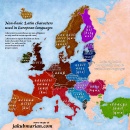 |
Special characters (diacritics) used in European languages
The “Basic Latin Alphabet”, as defined by the ISO, consists of the following 26 letters and their uppercase variants (and is identical to (...)
February 21, 2017 – Jakub Marian – Maps
|
 |
Spanish alphabet with pronunciation
Unlike English, Spanish has a very phonetic orthography (most letters have a fixed pronunciation). Spanish alphabet has 27 letters and 5 (...)
|
 |
The word “goodly” in English
One of the first things non-native English speakers learn is that the adverbial form of “good” is irregular. We don’t say, for example, (...)
November 2, 2016 – Jakub Marian – English
|
 |
Difference between ‘to be on fire’ and ‘to burn’
There is no significant difference between “something being on fire” and “something burning”, where “something” is a flammable material. (...)
October 26, 2016 – Jakub Marian – English
|
 |
‘Obliged’ vs. ‘obligated’ in English
The only verb form of “obligation” that is traditionally considered correct is oblige, not “obligate”, so you cannot make a mistake by (...)
October 14, 2016 – Jakub Marian – English
|
By the way, have you already seen my brand new web app for non-native speakers of English? It's based on reading texts and learning by having all meanings, pronunciations, grammar forms etc. easily accessible. It looks like this:
 |
Two opposite meanings of “arguable”
The verb “argue” has two significantly different (but related) meanings. First, you can argue with someone about something (or over (...)
September 27, 2016 – Jakub Marian – English
|
 |
‘Inhabited’ or ‘inhabitated’ in English
Long story short, the correct form is inhabited. The reason why people (especially non-native speakers) tend to think that the word is (...)
September 25, 2016 – Jakub Marian – English
|
 |
Difference between “float”, “swim”, and “sail” in English
Non-native speakers of English sometimes incorrectly say that a non-living thing, such as a boat or a piece of wood, “swims in the water” (...)
September 23, 2016 – Jakub Marian – English
|
 |
Definition of ‘cousin once removed’ in English
Two people are “first cousins once removed” when their relationship is that of first cousins plus one generation. In particular, this (...)
September 16, 2016 – Jakub Marian – English
|
 |
Origin of the phrase “Roger that” in English
Roger that or usually simply Roger (nowadays also often spelled in lower case) is a phrase used in aviation and the military to confirm (...)
September 7, 2016 – Jakub Marian – English
|

